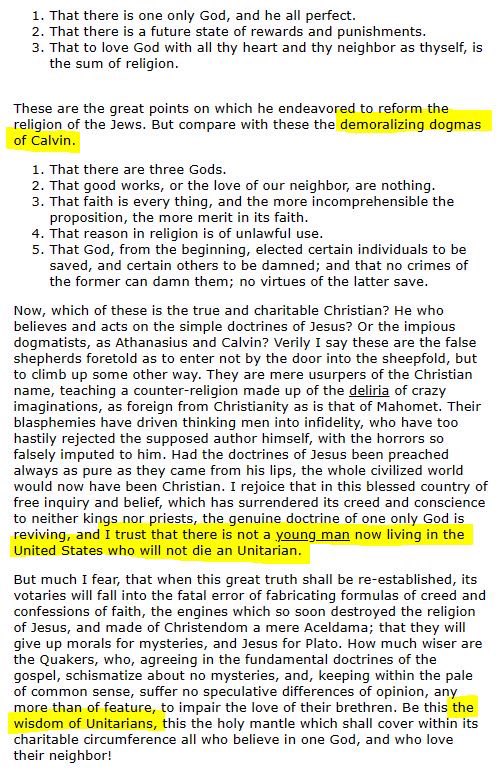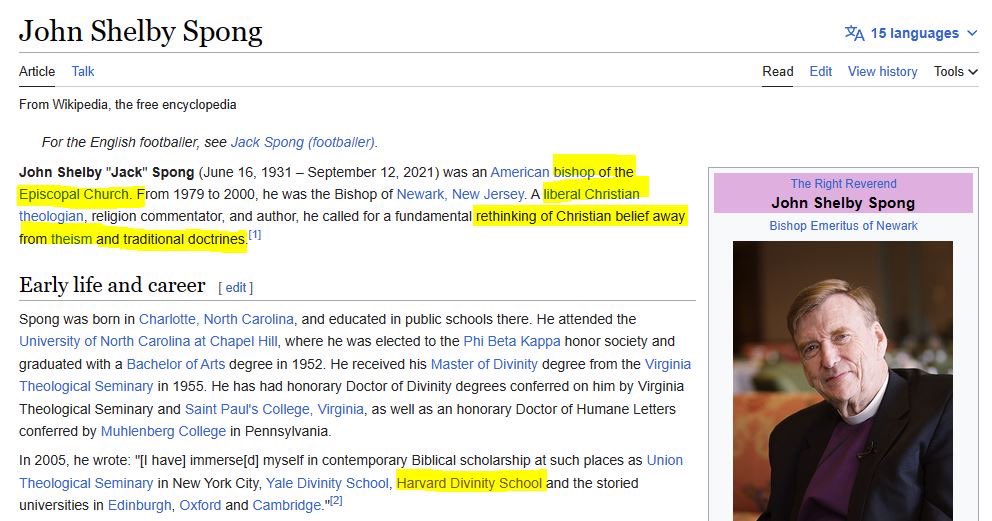UNITARIANISM 🧵
“All human conflict is ultimately theological.” —Cardinal Henry Manning
Here I will discuss the claim (popularized most notably by Moldbug) that Unitarianism is, and always has been, the de facto civic religion of the United States.
1/
“All human conflict is ultimately theological.” —Cardinal Henry Manning
Here I will discuss the claim (popularized most notably by Moldbug) that Unitarianism is, and always has been, the de facto civic religion of the United States.
1/

First, on Protestantism generally:
On the question of why the US moves further left with each generation, many have noted Protestantism's ingredient leftist tendency: rejection of capital-T Tradition & ancient hierarchy, primacy of personal interpretation of Scripture, etc.
2/
On the question of why the US moves further left with each generation, many have noted Protestantism's ingredient leftist tendency: rejection of capital-T Tradition & ancient hierarchy, primacy of personal interpretation of Scripture, etc.
2/
(Some Protestants may disagree with this characterization, that’s fine, it's not really the point here)
But not every variant of it is necessarily leftist, even less so Protestants themselves. Protestantism as such does not sufficiently explain our collective leftward creep.
3/
But not every variant of it is necessarily leftist, even less so Protestants themselves. Protestantism as such does not sufficiently explain our collective leftward creep.
3/
There is of course no shortage of right-wing Protestants in America, nor has there ever been. White evangelicals (e.g.) have been the most consistently conservative voting block in America for at least half a century, and Puritan sexual mores would make most tradcaths blush.
4/
4/

There’s also clearly no shortage of left-wing Protestants, more often found among mainline traditions (Methodists, Episcopalians, etc) whose pattern of ceding to new left dogmas with each passing generation is well-established.
5/
5/
https://twitter.com/antweegonus/status/1507542389476532225
And this is no surprise: if each may create his own version of Christianity, one would expect the versions to be as diverse as the people making them; leftist, rightist, and everywhere in between. And indeed this is what we find. Real marketplace of ideas moment.
6/
6/

However, while Protestantism is not *necessarily* left wing, it *potentially* is. I.e. it introduces for the first time in Christian history the possibility of a leftist (or any other -ist) version of Christianity, which is all that’s required for the following operation.
7/
7/
The Operation:
Step 1: Be a leftist
Step 2: Interpret Scripture in whatever way seems correct to you (a leftist)
Step 3: Produce own variant of Christianity based on said interpretation (which is leftist)
Step 4: World domination (you get the idea)
Enter: Unitarians
8/
Step 1: Be a leftist
Step 2: Interpret Scripture in whatever way seems correct to you (a leftist)
Step 3: Produce own variant of Christianity based on said interpretation (which is leftist)
Step 4: World domination (you get the idea)
Enter: Unitarians
8/

Though established Unitarianism first appeared shortly after the Reformation in mid-late 16th century Poland-Lithuania & Transylvania, for our Angloid purposes, Unitarians trace their lineage to the radical Anabaptists of the English Civil War.
9/
9/

The Anapabtists’ proto-leftism is well known, e.g. in 1534 when they seized a swathe of Munster in a failed communist insurgency, with reports even suggesting the presence of a “People’s Garden for Zwinglites Only” (not really, but probably).
Engels held them in high esteem.
10/
Engels held them in high esteem.
10/
https://twitter.com/antweegonus/status/1611483977097039872

As a breakaway sect, the Unitarians adopted from the Anabaptists various heterodox views, including the rejection of infant baptism and revolutionary egalitarianism. They dissented further from even more serious dogmas, including the Trinity, Christ’s Godhood, & original sin.
11/
11/
Unsurprisingly, the Unitarians were no friend of the Anglican hierarchy and faced persecution in England, where they were routinely fined, imprisoned, and barred from office. They were exempted specifically in the 1689 Toleration Act, and lacked full civil rights until 1814.
12/
12/

For the same reasons their radical theology isolated them from the Church and landed aristocracy, it endeared them to academia, where dissenting Protestants of various stripes (including Congregationalists, Arminians, and Arians) kept their progressive flame alive.
13/
13/
In response to their disenfranchisement, the Unitarians did two important things:
1) Develop a fixation on Tolerance as a core doctrine
2) Flee to America in droves, alongside other English Christian minorities (Puritans)
By 1700, American Unitarianism was well established.
14/
1) Develop a fixation on Tolerance as a core doctrine
2) Flee to America in droves, alongside other English Christian minorities (Puritans)
By 1700, American Unitarianism was well established.
14/
The Puritans weren’t Unitarian, but sympathy for Unitarian doctrine proved latent within them, especially their radical separatist branch known to us as the Pilgrims. In fairly short order, Mayflower descendants would be either converted, supplanted or replaced by Unitarians.
15/
15/

Anglo Congregationalism has had within it from the start a certain liberalizing undercurrent. Tensions between the orthodox/evangelical and liberal wings have periodically become inflamed at various points in American history, and that power struggle continues to this day.
16/

16/


The Pilgrims own church officially converted in 1801, when the Unis finally out-Congregated (play stupid games etc) the trad Cromwell-pfp types, forcing them to open a newer, sadder church down the street. Figuratively and literally, the Pilgrims & Unitarians switched places.
17/


17/



These are both worth reading in full for their “inside the house” treatment of the Pilgrim→Uni pipeline, as well as their distinct lib mixture of self-importance and condescension toward their under-enlightened predecessors.
18/
eastshore.org/sermons/novemb…
uuworld.org/articles/pilgr…
18/
eastshore.org/sermons/novemb…
uuworld.org/articles/pilgr…
Unitarian leftism is not a matter of mere historical accident, but proceeds from the theology itself—or more precisely, from the modern philosophy driving it.
Understand: Unitarianism didn’t take off because people just chose to reject the Nicea 1200 years later for kicks.
19/
Understand: Unitarianism didn’t take off because people just chose to reject the Nicea 1200 years later for kicks.
19/
It took off because, in the throes of “Enlightenment” the West subordinated its founding religion to the Cult of Reason and subjected all its doctrines to strict rationalism. The central mystery of faith, the Triune God, was first for the theological guillotine (theo-tine?).
20/
20/

Unitarianism dissolves a great uniqueness of the Christianity which has historically precluded its devolution into vague spiritualism. And here lies the answer to a historical religious mystery that has perplexed sensitive young Hitchens readers since the dawn of time (2006).
21/
21/

In the 17-18c, various shades of Deism (non-intervening, non-revelatory supreme being) were all the rage among the enlightened, influential elite; Jefferson, Franklin, Paine, Voltaire, to name only a few. Where’d those guys go?
They became Unitarians, or agnostics/atheists.
22/


They became Unitarians, or agnostics/atheists.
22/



Jefferson, usually known as Deist, was intensely enthusiastic about Unitarianism & self-ID’d as one later in life. He attended the services of arch-Unitarian Joseph Priestly and in 1822 predicted it to “become the general religion of the United States.”
Other correspondence:
23/



Other correspondence:
23/




Doctrinally, the Unitarians essentially dispensed with all the notable right-wing things about Puritanism (strict Calvinism, emphasis on propriety and social mores, etc), then dialed all the left-wing things about it (revolutionary egalitarianism) up to 11, then added more.
24/
24/
In the First Great Awakening of 1730s-40s, prominent Unitarians like Charles Chauncy stood against “fire-and-brimstone” preachers like Jonathan Edwards (of “sinners in the hands of an angry God” fame) & George Whitfield, preaching “an enlightened mind, not raised affections.”
25/


25/



As in Old England, the New England intelligentsia maintained a consistent affection for Unitarianism’s liberal sentiments and pushed it as an alternative to popular Calvinist revivalism. By the so-called “Unitarian Controversy” of 1815, *most* Boston churches were Unitarian:
26/
26/

Harvard, though originally formed as a seminary school to ensure a supply of Puritan ministers, had since the late 17c been the object of criticism for its liberalism. In 1701 some of the Calvinist Harvard grads even got so mad that they moved to New Haven and made Yale.
27/
27/

In 1805, Harvard elected its first Unitarian president Henry Ware, who promptly froze out the conservatives. Some of the Calvinists even got so mad that they moved to New Haven and joined up with Yale.
en.wikipedia.org/wiki/Andover_T…
It’s called we do a little pattern-noticing.
28/
en.wikipedia.org/wiki/Andover_T…
It’s called we do a little pattern-noticing.
28/

1825 saw the most decisive intra-Congregationalist schism with the formation of the American Unitarian Association under Harvard alum William Channing. In short order, the AUA was an influential liberal activist organization. Some of the Calvinists even got so mad that they…
29/


29/



The American Anti-Slavery Society was founded in 1833 by William Lloyd Garrison, a Unitarian. The Seneca Falls Convention of 1848 (first major feminist political demonstration in America) was replete with Unitarians, alongside Quakers, and another group as yet mentioned.
30/

30/


It was here, amidst the mid-19c political turmoil of abolition, suffrage, war, etc that the Unitarians would find their first true common cause with that other, less organized) post-Anabaptist sect: the Universalists, who would found the Universalist Church of America in ‘66.
31/
31/

The Unitarians at this point were still (mostly) professed Christians, but as with the Trinity, neither would this survive the theo-tine. Remember what I said about Trinitarianism acting as a protective agent against descent into vague spiritualism?
Enter: Transcendentalists
32/
Enter: Transcendentalists
32/

Transcendentalism began with the writings of Ralph Waldo Emerson (Harvard alum & son of a Unitarian minister), who with his 1836 essay “Nature” began a successor system to Unitarianism based on finding meaning through nature—more a philosophy than theology in any real sense.
33/

33/


The majority of Transcendental Club membership came from Boston Unitarian congregations, and most continued to ID as such. Two of the four (alongside Emerson) founding members, George Putnam and Frederic Hedge, were themselves Unitarian ministers. All were Harvard grads.
34/
34/

The Club was a who’s who of mid-century New England creatives: Emerson, Thoreau, proto-feminist Margaret Fuller, even proto-vegan Amos Alcott (father of Louisa May). Some other transcendentalists: Hawthorne, Whitman, and William Channing II (son of AUA founder).
35/



35/




One Emerson biographer described the meetings as a “changing body of liberal thinkers, agreeing in nothing but their liberality"
In other words, tolerance, adopted by Unitarians firstly as *a* religious principle, had after a few generations become *the* religious principle.
36/
In other words, tolerance, adopted by Unitarians firstly as *a* religious principle, had after a few generations become *the* religious principle.
36/
Importantly, the Transcendentalists did not see themselves as dissenters from Unitarianism, but rather as the true and natural heirs to the whole Unitarian project. This was no counter-movement, but a parallel movement, a successor movement.
Charles Mackay, 1850:
37/
Charles Mackay, 1850:
37/

By way of its massively influential adherents, Transcendentalism infused American Unitarianism—and Unitarian power centers like Havard along with it—with a corrosive Tolerance-ist spiritualism that would eventually erode from within Unitarian theology and unity.
/38
/38
By the early 20c, Unitarian activism continued but membership waned, and in 1961 the AUA combined with their old friends the Universalists to form the Unitarian Universalist Association. The UUA has no theology, no creed, no dogma. The only rule is that there are no rules.
39/

39/


UUism is uncommon as a religious affiliation today, mostly because it’s redundant. For a young progressive, why even go to a UU service? You already believe, say, & worship all the same things. The UU liturgy is you, every time you post the latest Current Thing infographic.
40/
40/

It’s easy to see the myriad ways in which UUism has seeped into American religion broadly. The mainstream of Evangelicals, Catholics, Mainliners, Jews, New Agers, and Nones have all been poisoned to varying extents by the trickle-down UUism of US power centers.
41/



41/




Though not institutionally, the UUist anti-religion maintains its death grip on US institutions as its state religion, and the warm affection of the powerful. Usually, this relationship is kept implicit and unspoken (who needs a church when you have a Party?), but not always:
42/
42/
https://twitter.com/wokepreachertv/status/1645404835288690688
If one were to create a religious framework for the Modern Structure of the Cathedral—decentralized, ideologized, subversive, deracinating, and utterly incoherent—he could not do better than UUism. It’s like it was designed in a lab, because it was. hds.harvard.edu
43/
43/
Though there are certainly other (perhaps more important) forces driving us ever-leftward, Unitarianism is one key to understanding a central mystery of US religion: Most US Christians lean right, yet US Christianity as a whole continues to move left. How?
44/
44/
In a word: power. Protected by the shield of institutions, Unitarians—with signature Puritanical duplicity—continue to move the center to the left, as Christians move to the center.
America rides Cthulu’s back, and Cthulu is a Unitarian Universalist.
45/
americanthinker.com/articles/2008/…
America rides Cthulu’s back, and Cthulu is a Unitarian Universalist.
45/
americanthinker.com/articles/2008/…
Cthulu went to Harvard. Cthulu believes in Science™ and is experimenting with blue frosted tips on his nasal tentacles. Above all, Cthulu holds nothing but contempt for the flyover chuds clinging to his narrow wings and dreams to be free of them. “Wgah'nagl fhtagn” indeed.
46/46
46/46

• • •
Missing some Tweet in this thread? You can try to
force a refresh


















